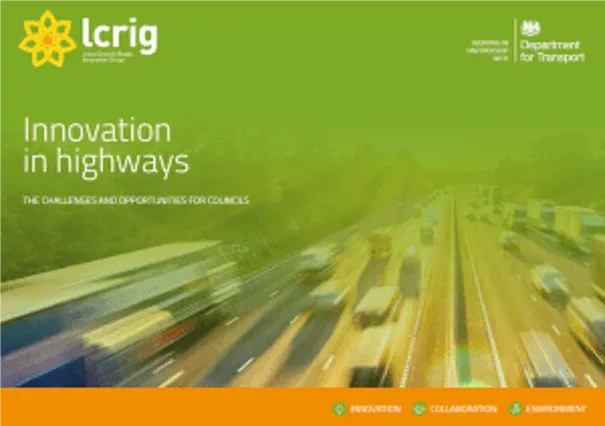A report by the Local Council Roads Innovation Group suggests that there is no shortage of enthusiasm when it comes to delivering innovation in highways, though differing approaches between authorities highlight the challenges around implementing it.
As local council highways teams come under pressure to up their game on innovation, LCRIG carried out an exclusive survey to find out more about activity levels, barriers and preferred incentives to encourage new ideas and processes.
This innovation survey was facilitated by the Asphalt Industry Alliance (AIA) as a voluntary addendum to its ALARM Survey, carried out at the beginning of 2021. The findings are based on data analysis by LCRIG.
The findings of the ‘Innovation in highways’ report show that political and senior leaders have a will to push forward innovation within councils, but that little is being done to recognise and reward innovations through things such as staff incentives.
When it comes to driving innovation forward in the sector, working with other local highway authorities and their supply chains through bodies such as LCRIG – along with working with their own supply chains – ranked joint highest amongst the English local authorities who responded.
The report also showed that more needs to be done to promote digitisation/innovation when attracting new graduates and apprentices into the sector. Respondents were asked ‘On a scale of 1-10, where 1 is low, how much do you promote digitisation/innovation when attracting new graduates and apprentices’.
Two English councils responded with a score of 10 and eleven others responded with a mark of 8 on the scale. However, nineteen local authorities provided a response of between 1-3, therefore dragging the average down to just 5.
There was a slightly more positive picture amongst the London councils who responded as the average score was 6, with just five authorities out of the 14 who answered giving a mark of 5 or lower. In Wales the average score was 5, with a highest score of 7 being given by three of the eight Welsh councils who responded.
62 English councils, 15 London-based councils and 8 Welsh councils all took part in the survey with key findings showing that:
– More must be done to drive innovation forward
– More focus on delivering innovation in the areas of new products/materials is needed
– Collaboration with local highway authorities and their supply chains through trade groups such as LCRIG is seen as important
– Lack of funding seen as biggest barrier to innovation
– Councils face procurement issues when delivering innovation
– Political and senior leaders have a will to push forward innovation within councils
– There is little being done to recognise and reward innovations through things such as staff incentives
– More needs to be done to promote digitisation/innovation when attracting new graduates and apprentices into the sector
Local Council Roads Innovation Group Chief Executive Martin Duffy said: “Innovation must sit at the heart of local authority highway teams. Our report into the state of innovation within local council highway departments makes for interesting reading.
“Whilst there are many positives to take from the findings there are also areas of concern which must be addressed to achieve greater parity amongst councils.
“At LCRIG we have a role to play in this, but it must also be said that only a collaborative effort will ensure this happens. So how can this be achieved?
“First and foremost, councils must work in partnership with the private sector. Ultimately, this is about innovation delivering value across the whole market. These types of collaborative partnerships will be key going forward as the sector aims to Build Back Better from the pandemic.”
Asphalt Industry Alliance (AIA) Chair Rick Green added: “As a Partner Member of LCRIG, the AIA is pleased to have been able to help facilitate this survey on Innovation. The data and analysis rings true for us as it highlights the potential for benefits to be gained for Innovators and clients working in partnership. It also emphasises the challenges faced by highways teams and individuals looking to innovate and ‘do the right thing’, despite tight budgetary constraints and in an historically conventional and risk averse sector.”
The full report is available to view here.
LCRIG continues to play a key role in helping to facilitate innovation within the sector. Earlier this year it launched a £150,000 Innovation Fund for road surface treatments in partnership with the highway marking and safety business WJ Group, which is funding the project.
The group also has an Infrastructure Innovation Board which has been set up to seek out new products/materials that can be trialled on the highway network and to strengthen the link between suppliers and contractors. The individuals on the board represent a range of different client organisations including central government, local authorities, Highways England, trade associations and utility companies.
(Picture – LCRIG)





















